| Srl | Item |
| 1 |
ID:
110906
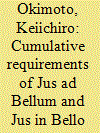

|
|
|
|
|
| Publication |
2012.
|
| Summary/Abstract |
It is sometimes suggested that even if certain measures in self-defense violate jus in bello (international humanitarian law), such measures can be continued by justifying them on the basis of jus ad bellum (international law regulating the resort to force), in particular by justifying that the measures were necessary and proportionate in relation to the initial armed attack. However, State practice, decisions of international courts and arbitration, and opinions of experts indicate the contrary, that if the measures in self-defense violate jus in bello, those violations cannot be ignored or nullified by justifying the measures as necessary and proportionate self-defense. Once the measures in self-defense violate jus in bello, they must be ceased immediately.
|
|
|
|
|
|
|
|
|
|
|
|
|
|
|
|
| 2 |
ID:
085002
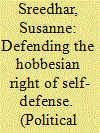

|
|
|
|
|
| Publication |
2008.
|
| Summary/Abstract |
A well-known part of Hobbes's political theory is his discussion of the inalienability of the right of self-defense. In this article, I present and defend a reinterpretation of Hobbes's account of self-defense. I begin by showing the weaknesses of the standard interpretation of this account: It rests on an implausible thesis about the evil of death; it renders Hobbes's applications of the right of self-defense inexplicable; and it conflicts with Hobbes's claim that there are cases in which the right of self-defense can be given up. I argue that we should understand Hobbes's claim to be that the right of self-defense is inalienable only in the social contract, and I offer a new interpretation of how his argument on this point might go.
|
|
|
|
|
|
|
|
|
|
|
|
|
|
|
|
| 3 |
ID:
085337
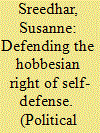

|
|
|
|
|
| Publication |
2008.
|
| Summary/Abstract |
A well-known part of Hobbes's political theory is his discussion of the inalienability of the right of self-defense. In this article, I present and defend a reinterpretation of Hobbes's account of self-defense. I begin by showing the weaknesses of the standard interpretation of this account: It rests on an implausible thesis about the evil of death; it renders Hobbes's applications of the right of self-defense inexplicable; and it conflicts with Hobbes's claim that there are cases in which the right of self-defense can be given up. I argue that we should understand Hobbes's claim to be that the right of self-defense is inalienable only in the social contract, and I offer a new interpretation of how his argument on this point might go.
|
|
|
|
|
|
|
|
|
|
|
|
|
|
|
|
| 4 |
ID:
085346
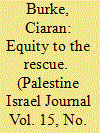

|
|
|
|
|
| Publication |
2008.
|
| Summary/Abstract |
The United Nation Charter war-i.e., the use of force by states across borders - illegal in all but two circumstances, these being self-defense and collective action authorized by the Security Council.
|
|
|
|
|
|
|
|
|
|
|
|
|
|
|
|
| 5 |
ID:
138803
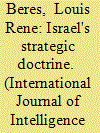

|
|
|
|
|
| Summary/Abstract |
If, as expected, Iran's ongoing nuclearization continues unimpaired, Israel will soon need to make certain basic revisions to its core strategic doctrine. These revisions would be substantially oriented toward enhancing the Jewish State's now-indispensable nuclear deterrence posture. Although largely counter-intuitive, such enhancement would actually require Israel to “disclose,” in carefully calculated increments, certain hitherto “ambiguous” aspects of the country's nuclear forces and infrastructures. In any such unique and unprecedented effort to systematically remove the “bomb from the basement,” major responsibilities for apprising political decisionmakers will fall upon the Israel Intelligence Community (IIC), most plainly MI (Military Intelligence, orAman) and the Israel Defense Force (IDF) Planning Branch. The IIC will need to be concerned with the following strategic doctrinal revisions.
|
|
|
|
|
|
|
|
|
|
|
|
|
|
|
|
| 6 |
ID:
093038
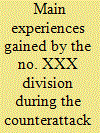

|
|
|
|
|
| Publication |
2009.
|
| Summary/Abstract |
The XXX Division, which for many years had been a unit engaged in full-time training, was assigned to conduct the main attack against Tong deng (VN:Dong Dang) and Liang shan (VN:Lang Son) during its participation in the counterattack in self-defense.
|
|
|
|
|
|
|
|
|
|
|
|
|
|
|
|
| 7 |
ID:
093032
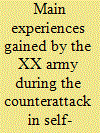

|
|
|
|
|
| Publication |
2009.
|
| Summary/Abstract |
Participation by the XX Army in the Counterattack in Self-Defense Against Vietanm began on February 17, 1979, and ended on March 16, 1979. It lasted for twenty-eight days.
|
|
|
|
|
|
|
|
|
|
|
|
|
|
|
|
| 8 |
ID:
093035
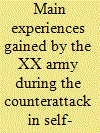

|
|
|
|
|
| Publication |
2009.
|
| Summary/Abstract |
During the Counterattack in Self-Defense on the Sino-Vietnamese border, the XX Army Deadquarters led two division in the direction of Zhi ma (V N: Chi Ma) on the left flank of Liang shan(VN: Lang Son) as well as Lu ping(VN: Loc Binh)and Mi mai shan (VN: Me Mai Son).
|
|
|
|
|
|
|
|
|
|
|
|
|
|
|
|
| 9 |
ID:
164461


|
|
|
|
|
| Summary/Abstract |
Using the example of the right to self-defense under customary international law, we engage with questions concerning the linkage between norm robustness and legality. We draw out important differences between validity contestation and applicatory contestation within law. In so doing, we connect the international relations (IR) debate over norm robustness with our framework of interactional international law, bringing together constructivist insights into social normativity and a theory of international legality. We hypothesize that norms that meet the requirements of legality and are upheld by practices of legality enjoy “validity” and “facticity” (as defined by Deitelhoff and Zimmermann) and are “robust.” This model reveals that law operates through a continuing process of contestation. The requirements of legality impose a discipline, such that legal contestation will normally be applicatory contestation. Through practices of legality, therefore, legal norms can be maintained or shifted. However, legal norms may decay when practices of legality weaken or when challenges amount to validity contestation. The currently heightened contestation surrounding the circumstances under which the right to self-defense can be exercised against nonstate actors allows us to explore and illustrate of these dynamics.
|
|
|
|
|
|
|
|
|
|
|
|
|
|
|
|
| 10 |
ID:
120607
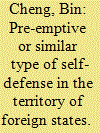

|
|
|
|
|
| Publication |
2013.
|
| Summary/Abstract |
In reviewing the legality of pre-emptive self-defense, the question is raised, first, whether there is a case for tightening up the meaning of the term "self-defense" by calling it "legitimate self-defense", on account of its relative ambivalence in ordinary usage. Next, why self-defense in the territory of other States is different from self-defense in other areas is explained. Because the Caroline Incident is often invoked as legitimizing pre-emptive self-defense, and the reasoning of the Nuremberg judgment in one instance appears to support this view, an examination is made of the lessons to be learnt from the Caroline Incident as to the conditions governing self-defense and also of the relevant part of the Nuremberg judgment. The conclusion is that, while the verdict in the case concerned in the Nuremberg judgment is correct, the reasoning is open to question, and the Caroline Incident does not support the case of pre-emptive self-defense.
|
|
|
|
|
|
|
|
|
|
|
|
|
|
|
|
| 11 |
ID:
000799
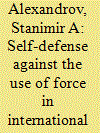

|
|
|
|
|
| Publication |
The Hague, Kluwer Law International, 1996.
|
| Description |
xii,359p.
|
| Standard Number |
9041162477
|
|
|
|
|
|
|
|
|
|
|
|
Copies: C:1/I:0,R:0,Q:0
Circulation
| Accession# | Call# | Current Location | Status | Policy | Location |
| 042147 | 341/ALE 042147 | Main | On Shelf | General | |
|
|
|
|
| 12 |
ID:
137897
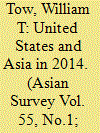

|
|
|
|
|
| Summary/Abstract |
Visible U.S. efforts to sustain influence in the Asia-Pacific met with mixed success. President Barack Obama’s visit to the region reinforced alliance commitments, but U.S. policy momentum on regional trade and diplomacy remained sluggish. Washington’s effective management of its relations with Beijing remains the key factor to how well the U.S. will fare with other regional actors and issues.
|
|
|
|
|
|
|
|
|
|
|
|
|
|
|
|